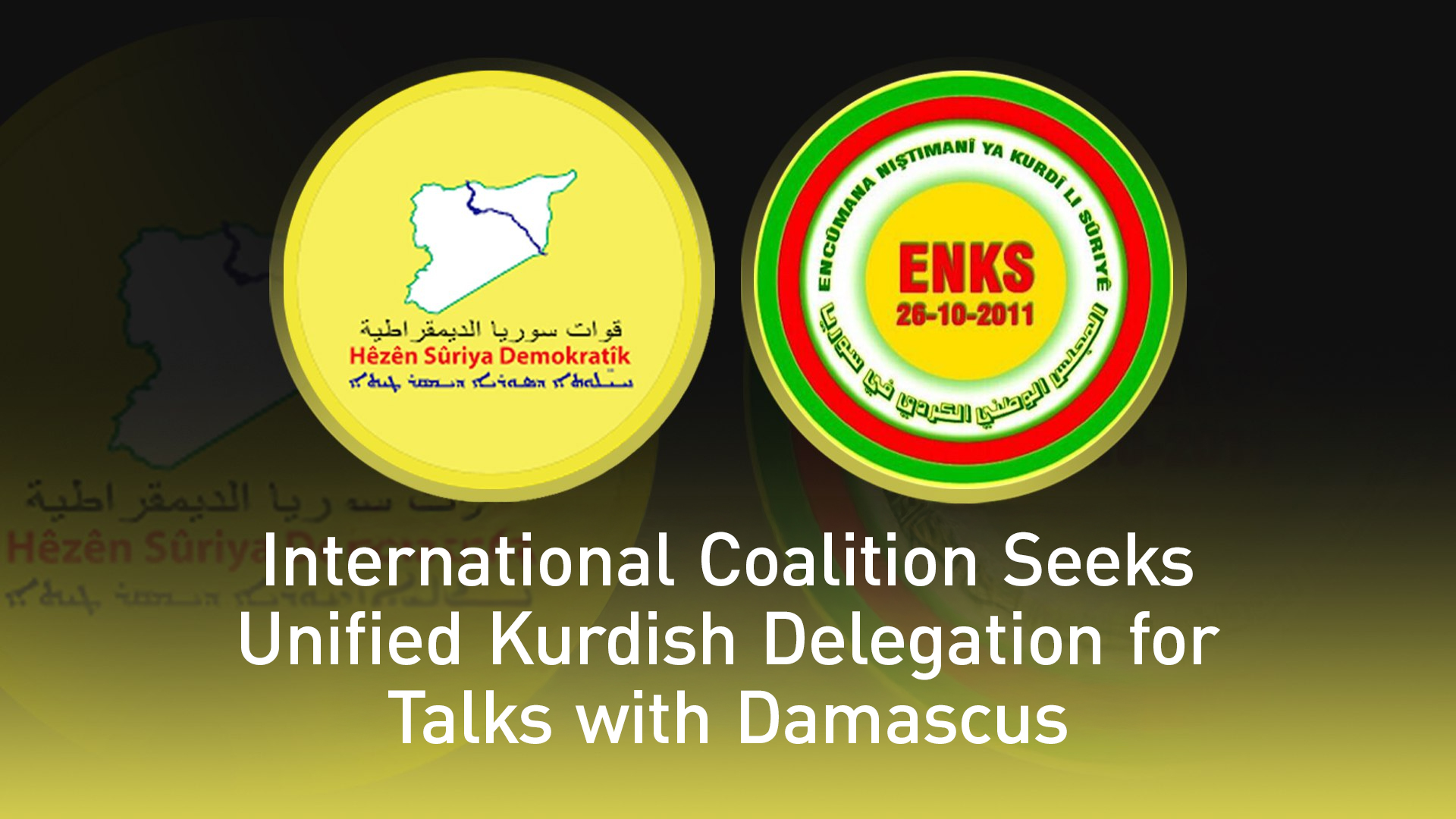International Coalition Seeks Unified Kurdish Delegation for Talks with Damascus
The discussions focused on the latest political developments in Syria, reviving internal Kurdish dialogue, and addressing the absence of Kurdish representation in the national dialogue committee.

ERBIL (Kurdistan24) – The International Coalition is working to establish a unified Kurdish delegation for negotiations with Damascus, following the exclusion of Kurdish representatives from the Preparatory Committee for the upcoming Syrian National Dialogue Conference, according to Asharq al-Awsat.
This exclusion, despite Kurds being the second-largest ethnic group in Syria, has sparked strong opposition from Kurdish political entities.
Coalition Efforts to Bridge Kurdish Divisions
A high-level delegation from the coalition, along with U.S. and French envoys, held meetings with leaders from the Kurdish National Council in Syria (KNCS) and the Autonomous Administration of North and East Syria (AANES).
The discussions focused on the latest political developments in Syria, reviving internal Kurdish dialogue, and addressing the absence of Kurdish representation in the national dialogue committee.
Faisal Yusuf, the official spokesperson for the KNCS, stated that the council had a clear and unified stance on the matter.
"We emphasized the need for a common vision and a unified Kurdish delegation to ensure our voices are heard at the international level," he said.
The meetings also addressed the broader political landscape following the fall of the previous regime and the necessity of direct negotiations with Damascus.
Kurdish Political Reactions to Exclusion
The announcement of the committee’s composition on February 12—comprised of seven members, including two women—was met with widespread criticism from Kurdish political organizations.
In a statement, the AANES asserted that the committee "does not represent the diverse spectrum of Syrian society" and described its formation as an early sign of marginalization.
The administration declared its refusal to engage in dialogue with the committee, stating, "No meaningful negotiations can take place under such exclusionary practices."
The KNCS echoed similar concerns, arguing that the committee should reflect Syria’s multi-ethnic and political diversity.
"The exclusion of Kurdish representatives is a serious deviation from the principle of national partnership,” the council said in a statement, warning that such a move raises doubts about how Syria’s political transition will be handled.
Faisal Yusuf further highlighted the risks associated with sidelining the Kurdish component in shaping Syria’s future.
"Kurds are original partners in building the state and represent a significant portion of Syria’s geography. Their exclusion undermines the credibility of the dialogue process," he added.
Calls for Inclusive Representation
The AANES warned that the committee's restrictive approach risks reverting Syria to a centralized system.
"This lack of inclusivity threatens to undo years of efforts toward decentralization and political reform," the administration’s statement read.
It called for the representation of all Syrians, ensuring national unity and shared governance.
The KNCS also urged the Syrian authorities to reconsider the committee’s structure.
"For the national dialogue to achieve its objectives, it must adhere to the principles of national partnership and balanced representation," the council emphasized.
Concerns Over Political Marginalization
Several Kurdish leaders voiced concerns that the exclusion is part of a broader strategy to weaken Kurdish political influence in Syria.
Faisal Yusuf warned that certain local actors were actively working to prevent Kurds from securing their legitimate democratic rights.
"Some parties are intent on obstructing Kurdish political aspirations, and they must reconsider their approach," he said.
Salih Muslim, a senior figure in the Democratic Union Party (PYD), criticized the committee’s formation, stating that it represents only one political faction.
He stressed that entities such as the Syrian Democratic Council (SDC) and AANES must be fairly represented to ensure the legitimacy of the process.
Farhad Shami, the media director for the Syrian Democratic Forces (SDF), expressed strong opposition to the exclusion of the SDF and AANES from the national dialogue.
In a post on X, he wrote: "Any Syrian conference that excludes the SDF or the Autonomous Administration is neither national nor cohesive. It seeks to repeat the failed exclusionary policies that led to Syria’s fragmentation and destruction."
As diplomatic efforts continue, the international coalition is pushing for a more inclusive and representative Kurdish delegation to engage in talks with Damascus.
Kurdish political parties insist that any long-term political settlement must guarantee full representation and national partnership, ensuring that all components of Syrian society have a say in shaping the country’s future.